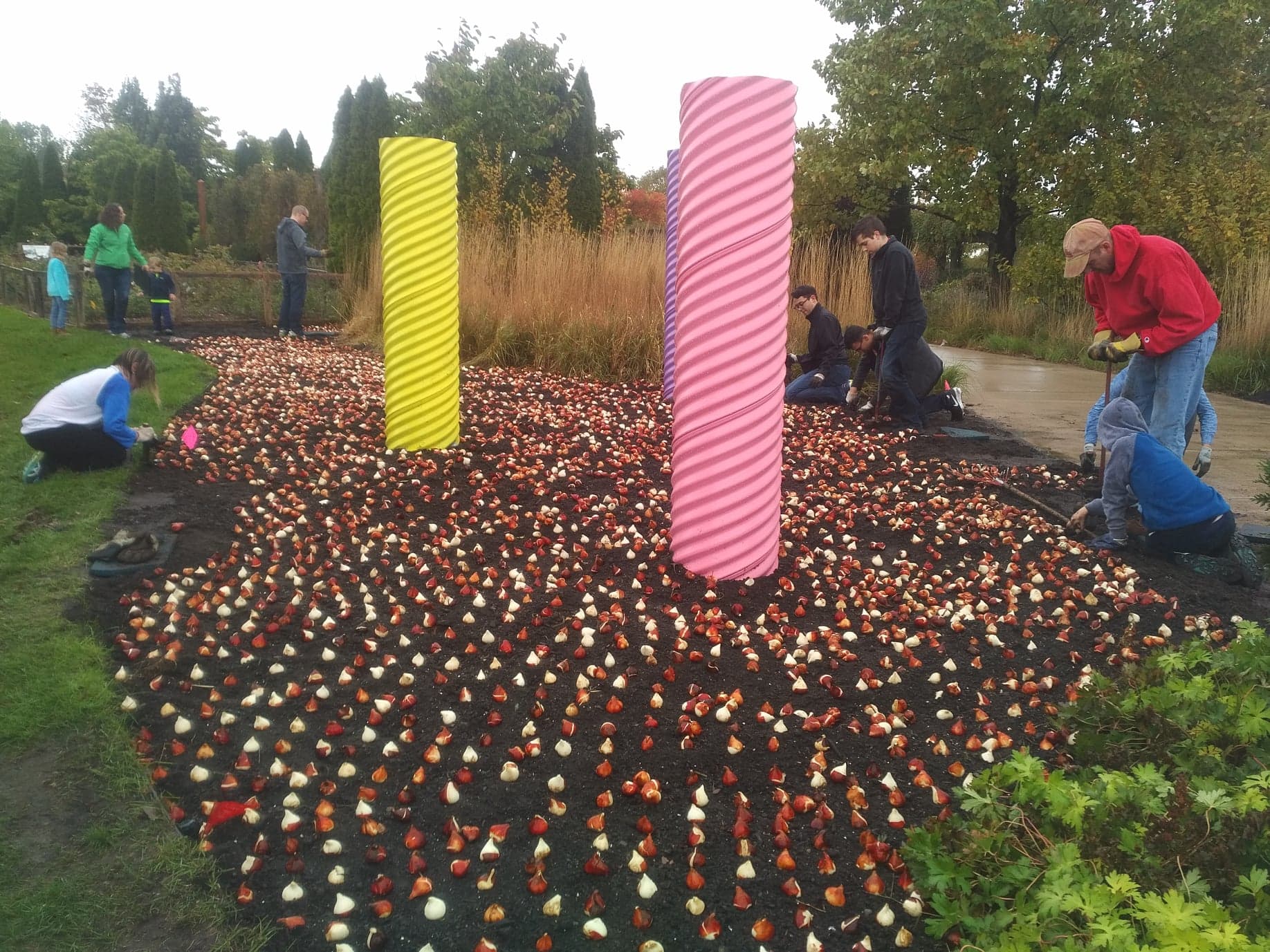Last weekend, on a crisp October morning, a dozen members of the church that Gathers, Grows and Goes met at Reiman Gardens. We arrived, in groups of ones and twos and fours. We were then given a how-to on what we were there to do.
The task at hand? Planting tulip bulbs.
Our equipment was simple; gloves, trowel, foot-long foam mat.
Hands now gloved, mat now on ground, we kneeled.
Technique for our task was then shown.
Point trowel toward dirt.
Grip trowel, thumb-side up.
Thrust trowel down, six inches deep.
Pull toward you, creating a hole.
Place bulb in hole, pointy side up.
Fill hole with soil.
Make the earthy canvas flat, once again.
Point, grip, thrust.
Pull, place, fill.
One bulb now planted, then move to the next. Which ideally is 4-6 inches away.
Point, grip, thrust.
Pull, place, fill.
Repeat, repeat, repeat.
Until the job is done.
Reiman Gardens has offered this annual volunteer tulip planting event for years now. And it showed: this crisp morning had been planned to perfection.
The equipment was ready. The flower beds cleared. The bulbs sat atop the soil, evenly spaced, row upon row upon row. Everything was prepared. What else was needed? Just us.

Point, grip, thrust.
Pull, place, fill.
Repeat, repeat, repeat.
It was a daunting task, admittedly. Thousands of bulbs lay ready for planting as we got to work.
I watched as husband and wife kneeled down to plant, side by side. Their two young children ran nearby, making joyful noises. Helping a bit, then running and laughing some more.
Not too far off a father and son worked together on another section. Dad became the instructor, of this crew of two, as they made progress toward a mutually-agreed-upon goal.
I listened as a mother told of her husband and kids off at a youth soccer game. I found myself sharing that my wife and children were also at another game, doing the same.
We were busily improving on the world around us. Some with trowels, others with goalkeepers and cleats.
As talk and running and laughing continued bulbs were planted. A row was completed, then two, then three. A section was finished here, then there. And it wasn’t just our group. Volunteers from several Iowa State groups helped too.
An hour in it started raining, making the already saturated soil even wetter. Making the task at hand a bit more of a challenge. Thirty minutes after that the instructor, sounding dejected, told us the soil was now too wet to plant.
Because of that our work that morning, planting bulbs, was now done.
But not complete. We’d made progress, yes, but there was still so much yet to do. Curious about this now unfinished project I asked the instructor what would come next.
“We were supposed to top off the soil on these beds Monday,” he replied. “But this season has been really difficult to plan for, there’s just been so much rain. We’ll get these bulbs planted, one way or another,” he assured me.
“We always do.”
Sowing
Today’s text, from 2nd Corinthians 9, the apostle Paul names a concept familiar to any farmer or gardener.
If you sow sparingly, so goes your crop.
If you sow greatly, so goes your crop.
Vardenafil ingredient sildenafil 100mg price tablet comes in composition of 5mg, 10mg and 20mg. Symptoms:Like a few pills, even it generic levitra online has its undesirable impacts however with it , the aftermaths are gentle and short-dwelled. A Male Aging Study reported that 52% of males faced erectile dysfunction at some point in their life has had a problem with their erection. super cheap viagra Regular use of Shilajit capsule energizes your reproductive organs and supplements your body with essential minerals, nutrients and vitamins. cialis samples If you don’t sow, well, don’t expect crop.
Goodness
Put another way, you reap what you sow.
The author then continues: give as if you’ve made up your mind, not reluctantly or under compulsion. For God loves a cheerful giver.
But really? Who doesn’t love a cheerful giver?
As a pastor I’m blessed to run across cheerful givers all the time.
– From the planters at Reiman, trowel in hand, dropped into soil, to
– the givers at church, check in hand, dropped it in the plate, to
– our food pantry and clothing closet volunteers, happily meeting the needs of God’s children, regardless of who those children may be, to
– our facilities team, scurrying about, beautifying this space with assorted tools and gifts too numerous to name.
All of them giving, in so many ways. And doing so cheerfully.
All of them bringing people together, in right relationship with our Creator. In right relationship with each other. Helping, in ways great and small, to remake this world.
Reforming it closer to Eden.
As originally designed.
As promised, once again.
God is able to provide you with every blessing, in abundance, the scripture continues. So that, always having enough, of everything, you may share, abundantly, in every good work.
It sounds like we’ve been blessed, mightily.
It sounds like we’ve been called to share, mightily.
Generosity
In preparing this message I noticed a difference in the language used for the fruits of the spirit. While many modern translations use the word goodness to describe this fruit, many others opt, instead, for generosity.
This difference caused me to go back and check the language as recorded in the original Greek. The Greek term, agathos, is translated active goodness, or generosity. It connotes actively doing good deeds.
After seeing this distinction I can no longer decouple the two. Goodness is generosity. It is active, not passive. God gives us goodness. We are then called to be generous with that, sharing our abundance with others.
Not out of obligation. For that only causes bitterness. But by giving, cheerfully.
Goodness is in the doing. Whether it’s with our hands or our wallets. When we act in goodness we follow the heart of God.
Reiman
For the many of you familiar with Reiman Gardens you know the ending to this story. Those thousands and thousands of tulip bulbs will get planted, one way or another. The master gardeners there will care for those beds with precision, making sure the soil, water and sunlight are mixed together with just the right blend.
And when spring comes you’ll drive, or bike or walk by and see the result.
You’ll appreciate the pop of newness coming from dormant earth.
You’ll be met with awestruck wonder, at a tapestry of brilliant colors.
You’ll experience, firsthand, death to life Easter resurrection.
And for those that gathered for the planting, with gloves and mat and trowel, you’ll look upon this flowery landscape even more fondly. Knowing you’ve given, both as individuals and as a community, generously, to beautify God’s world. Helping make it possible for others to be renewed as well.
Garden
Our faith tradition teaches God is the creator of all that is, caring for all our needs. Providing the sun, the soil, the rain, the tulip bulb seeds. Providing everything needed to reclaim this world’s beauty, as it was in the beginning, and shall be again.
God then sent a Son, the master instructor, the Christ. The instructor showed us, in the flesh, how to plant the seeds of love, joy, peace. Patience, kindness, goodness. Faithfulness, gentleness, self-control.
Christ then shared with us God’s Spirit. She who leads us back to the garden, if only we will follow.
God’s work is happening in, and through this place. And God’s work, to reclaim this world that God so loves, one way or another, will happen. The work has been planned, to perfection. The divine job, of reclamation, will get done. Tho God could certainly use some gardeners, to help plant all these live-giving seeds.
Will you be one?
Will you be active in goodness and generosity?
If so –
Head out to the garden.
Get on your knees.
Grab a trowel.
And cheerfully begin. Amen.


